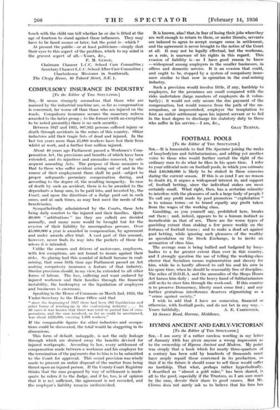COMPULSORY INSURANCE IN INDUSTRY [To the Editor of THE SPECTATOR.]
Sra,—It seems strangely anomalous that those who are maimed by the industrial machine are, so far as compensation
is concerned, far worse off than those who are injured on the roads. Compulsory insurance secures the monetary redress awarded to the latter group ; to the former (with an exception to be noted presently) there is no such security.
Between 1927 and 1933, 987,935 persons suffered injury or death through accidents in the mines of this country. Other industries add their tragic lists of dead and injured. In the last ten years more than 25,000 workers have lost their lives whilst at work, and a further four million injured.
About 40 years ago Parliament passed a Workmen's Com- pensation Act, the provisions and benefits of which have been extended, and its injustices and anomalies removed, by sub- bequent amending Acts. The purpose of those measures is that to those who suffer accident arising out of and in the course of their employment there shall be paid—subject to proper safeguards—pecuniary compensation during, and according to the degree of, the resulting incapacity. In case of death by such an accident, there is to be awarded to the dependants a lump sum, to be paid into, and invested by, the Court, and upon the directions of a Judge paid out in such sums, and at such times, as may best meet the needs of the beneficiaries.
Sympathetically administered by the Courts, these Acts bring daily comfort to the injured and their families. Quite 80,000 " arbitrations " (as they are called) are decided annually, and many more would be brought but for the evasion of their liability by unscrupulous persons. Over X5,000,000 a year is awarded in compensation, by agreement and under awards after trial. A vast part of this amount, however, never finds its way into the pockets of those for whom it is intended.
Unlike the owners and drivers of motor-cars, employers, with few exceptions, are not bound to insure against their risks. So glaring had this scandal of default become in coal- mining, that some little time ago Parliament passed an Act making compulsory insurance a feature of that induStry.
Similar provision should, in my view, be extended to all other forms of labour. The loss, suffering and want endured by injured workmen and their families through the financial instability, the bankruptcy or the liquidation of employers and businesses is enormous.
Speaking in the House of Commons on March 2nd, 1934, the Under-Secretary to the Home Office said that
"since tho beginning of 1927 there had been 283 liquidations and other forms of winding-up in tho coal-mining indtistry . . . In 30 cases it was known that there was total or partial loss of com- pensation, and the sum involved, so far as could bo ascertained, was about £220,000, covering 1,899 workers."
If the comparable figures for- other industries and - occupa- tions could be discovered, the total would be staggering in its dimensions.
This form of default, unhappily, is not the only leakage through which are drained away the benefits devised for injured workpeople. According to law, every settlement of compensation made between a workman and his employer for the termination of the payments due to him is to be submitted to the Court for approval. This sound provision was wisely made to prevent an unfair disposal of the matter from being thrust upon an injured person. , If the County Court RegiStrar
thinks that the sum proposed by way of settlement is inade- quate he refers it to the Judge, and if he, too, is of opinion that it is ni..t sufficient, the agreement is not recorded, and the employer's liability remains undiminished. It is known, alas! that, in fear of losing their jobs when they are well enough to return to them, or under threats, servants are induced to agree to accept meagre sums in settlement, and the agreement is never brought to the notice of the Court at all. It may not be legally effectual, but the workman, as a rule, is unaware of his rights in this regard. This evasion of liability is—as I have good reason to know —widespread among employers in the smaller businesses, in offices and domestic service. It is an evasion that could, and ought to be, stopped by a system of compulsory insur- ance similar to that now in operation in the coal-mining industry.
Such a provision would involve little, if any, hardship to employers, for the premiums are small compared with the risks undertaken (large numbers of employers do it volun- tarily) ; it would not only secure the due payment of the compensation, but would remove -from the path of the un- scrupulous, or impoverished, employer the temptation to foist an unfair settlement upon his injured servant or to fail in the least degree to discharge his statutory duty to those who suffer in his service.—I am, &c.,
GRAY TEMPLE.














































 Previous page
Previous page